Sakari Oramo renewed today as chief conductor of the BBC Symphony until 2022.
Unless the Brexiteers replace him with a Union Jack.

Sakari Oramo renewed today as chief conductor of the BBC Symphony until 2022.
Unless the Brexiteers replace him with a Union Jack.

The best-selling author Tom Wolfe, whose Radical Chic: The Party at Lenny’s, exposed human cracks in an American idol, died today.
He was best-known for the Wall Street wind-up novel, The Bonfire of the Vanities.

Marcia Butler offers this memorial tribute to a great mensch on the oboe:
It is an honor to speak about Rich Dallessio, an extraordinary human being, an exceptional artist and my dear, dear friend of many years. It’s difficult to cull down everything that Rich meant to me and to the music community in the minutes available here. There is just so much to celebrate about him. The two things that stand out, are his devotion to me as a friend and the impact he had on my life, and his incredible accomplishments as an oboist.
I can’t remember the exact occasion when I first met Rich, though it was, of course, on a job. We played together for years, from the mid 80’s until my retirement ten years ago. And it was always a total joy. But this joy held a very special quality because Rich was a unique colleague. This town is filled with superior oboists and while healthy camaraderie is usually the norm – things were different with Rich and me. In all the years I performed with him, I never, for one second, felt a competitive or jealous edge from Rich. We were fluid with our positions – he played first, he played second and he played English Horn. I did exactly the same. And it never, ever, mattered. We were in each other’s corner, wishing the other success.
I’ve thought a lot about this over the years. Because we were contrary players, with different sounds and ideas about music. We studied with vastly different teachers whose approach to oboe playing could not have been more dissimilar. I respected and loved Rich’s musical sway, and I’d like to think he found mine to be worthy too. Perhaps this was part of the reason we were so easy with each other. I could never play the way he did, and he couldn’t emulate me. Nor did we want to.
What made Rich a truly one of a kind oboist? He could play lead at the Met in Aida on a two-hour notice, beautifully, with complete knowledge of the opera and nail the solos, particularly in the third act. I heard him do just this a little over a year ago. It was simply gorgeous and I was so proud of him. He also played the most perfect second oboe imaginable. It is a special gift to not only play softer than the lead player and keep your pitch up in the low register, but also understand subtle voicing and blend. He knew exactly how he needed place his sound and pitch when playing tutti with the woodwinds. He had in impeccable ear, his pitch practically flawless. And watch out, he could nail poor intonation out of a line-up of 30 players. Sometimes that was me, and I was grateful when he told me. And last but not least, his English Horn playing simply slayed me. He was particularly proud to finish his career as solo English horn at the NYC Ballet, a job he adored. He just recently told me how lucky he was to have that job and how he revered his colleagues in that orchestra. I know Rich would want you all to know that.
I detail all this, because everyone on stage certainly appreciates when the oboes are particularly yummy, but playing all three positions on the level he did, was rare. They are more different than anyone could imagine, unless you’re an oboist. Rich was that kind of player – he could do it all brilliantly, and he was invaluable to any orchestra he played with: The Met, The Ballet, European orchestras coming through Carnegie, and the list goes on and on and on. This was Rich’s genius, and I use that term particularly.
But we shared much more, and this is the other part of the puzzle that made us the best of colleagues. We were close friends, and held marathon sessions on the phone. The topics ranged: The stock market. Reeds, of course. Conductors, ahem. Work. Weight lifting. Messiaen – a particular love of Rich’s. Our spouses. Dogs. Pianos – he had four at last count and played beautifully, by the way. Organs – the kind in churches. Our regrets. Our sadness. Food. Gas stations. The Dallessio Clan – a soon to be a three-part movie of the week on the Lifetime Channel. Love. The Golden Girls. And yes, sex. On and on. There were gaps in communication, of course, but as the cliché goes – there were no gaps. Not really. We just picked up and we dished. He was an invaluable friend to me – someone I could trust and whose moral compass was perfect North. I knew Rich’s secrets and he knew a few of mine.
When Rich was diagnosed and his treatment determined, he and Kenny asked me to sit with them on chemo days. I know a thing or two about sitting in a chair for many hours and feeling incredibly weird and indescribably ill, while poison slips into your veins. So, at the end of summer, through the fall and into this new year, I went pretty much every other week. Kenny would get food from the local diner, and they quickly became his best friends, of course. The three of us would eat lunch and take inventory like there was no tomorrow. There were prisoners, yes, but everyone lived. No topic went unexamined and in excruciating detail. We laughed, and Rich had the best laugh around – his eyes would disappear – sheer glee. His chemo nurse, Grace – an angel – would come in from time to time to check on Rich. And we’d always ask if we were too loud for the other patients. Because all we did was laugh really loudly. She assured us, no. But who could blame us. It was a god damned party; the best of times in a painful bubble of the worst of times.
There was so much joy and love in that tiny hospital room, crammed with Rich’s recliner and our two chairs. I felt honored to witness two people completely devoted to making the other happy. Yes, it went both ways. But there was nothing that Kenny would not do for Rich. His devotion to Rich, at times, literally raised the hair on my neck. It was pure. Long relationships are made up of a lot of heart and gristle – nothing is ever perfect. But what I observed was love playing out in a breathtaking way. I saw a manner of loving that was at once profoundly beauty, almost heroic in its breadth, and also something to aspire to. It sounds unattainable, yet there it was, in this small room. Week after week. Love.
The final day I saw Rich was at his last treatment in mid-February. He came into the suite and I could see that something was wrong. He sat next to me and became teary. It turns out, it wasn’t his disease that was bothering him, it was his performance at the Ballet the previous evening. We musicians in this room know that when we make mistakes in a concert – we just push through. But the next morning, the quarter backing can drive us literally crazy. I made him tell me, in detail, what went wrong. I thought, if I can diffuse it a little for him, he’ll be able to give himself a break. And indeed, the errors were almost negligible; more like flubs which he corrected immediately.
I said – Richie, it’s not so bad, really very small.
He said – But Marsh, I let my colleagues down, and the music wasn’t right.
That, my dear friends in this room, is what was so special about Rich Dallessio. There was no ego involved – nothing about his playing. Just the professionalism of wanting to be the best he could be for his colleagues and, of course, for the music.
Rich Dallessio’s warmth and immense integrity as a man cannot be divorced from his brilliance as a musician. The two are inextricably linked and made him the musician and the friend I will never forget.
And I will miss beyond comprehension.
The way he was humble.
The way he was self-assured.
The way he was kind.
The way he would not back down.
The way he was gentle.
The way he was my friend.
The way he was a loving husband.
And the way music will always remember him – and every melody he ever played, which is shimmering in the air right now.
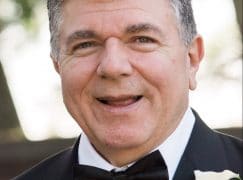
A British surgeon has reviewed the post-mortem evidence on great composers and finds that many have been wilfully maligned by their biographers.
“The list of composers who had syphilis is short,’ says Jonathan Noble, in a promotion for a forthcoming book. ‘The list of composers said to have had syphilis is enormous.’
Read on here.
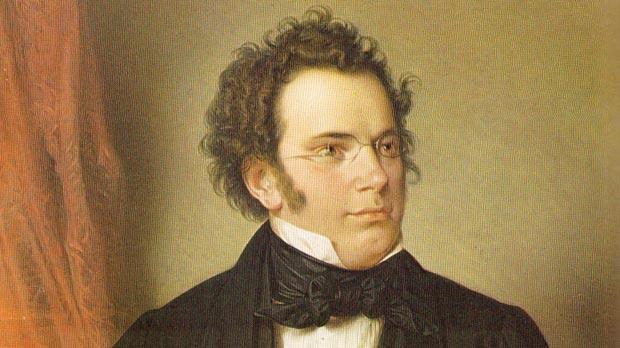
When Houston opened its opera house at the Wortham Theater Center in 1987, Plácido Domingo starred in Aida. Three decades later, Domingo returns to Wortham on September 26 for a gala evening marking the company’s return to its premises, flooded out by Hurricane Harvey.
Nice.

press release:
Birgit Nilsson Foundation President Rutbert Reisch announced today in Stockholm that the ($1 million) Birgit Nilsson Prize for 2018 will be awarded to Nina Stemme. The Prize Award Ceremony will take place in the presence of Their Majesties King Carl XVI Gustaf and Queen Silvia on October 11, 2018 at the Royal Opera House in Stockholm, Sweden, at which time the Prize will be presented by His Majesty. At the ceremony, the Royal Opera Orchestra led by American conductor Evan Rogister will accompany renowned Welsh bass-baritone Bryn Terfel and Swedish soprano Christina Nilsson.
Also announced at the press conference, the Birgit Nilsson Foundation will be transferred in January 2019 to the care of the Royal Swedish Academy of Music in Stockholm.
Upon receiving news of the Birgit Nilsson Prize, Nina Stemme commented, “It is a great honour to be recognized for my work, but it is even greater to be recognized in my home country by a world-renowned organization that bears the name and carries the legacy of a legend…my idol Birgit Nilsson. As this is her centenary, receiving this award becomes a most humbling and extraordinary honour. I am very grateful to be connected with this great lady and to be in the company of Maestro Domingo, Maestro Muti and the Vienna Philharmonic, all of whom have previously received this extraordinary award.”
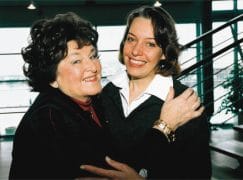
The judges, who serve for renewable three-year periods, have remained the same for 2011, 2014 and 2018. They are:
Bengt Hall, former Managing Director of the Malmö Opera, and former General Manager of the Royal Swedish Opera Stockholm
Eva Wagner-Pasquier, former Co-Director of the Bayreuth Festival
Clemens Hellsberg, former President of the Vienna Philharmonic
Rupert Christiansen, Opera Critic of the Daily Telegraph and Member of the Editorial Board of OPERA
Speight Jenkins, former General Director of the Seattle Opera.
La Monnaie has announced the death of Karl-Ernst Herrmann, one of the signature discoveries of the Gerard Mortier era. He was 81.
Brought to Berlin by Peter Stein in 1971, he worked as a designer with Claus Peymann and Luc Bondy before making his director debut in Brussels in 1982 with La clemenza di Tito. With his wife Ursel, he went on to make productions for the Salzburg Festival, Baden-Baden, Berlin and Vienna State Opera and many more.
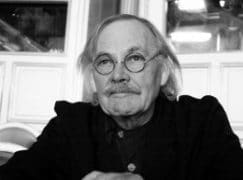
The pianist Gabriela Montero has posted from Istanbul:
TONIGHT’S CONCERT IN ISTANBUL HAS BEEN CANCELLED due to the violent situation in Gaza..
Erdogan has called for three days of mourning and all public events have been cancelled.

Daniel Webster, who has died at 86, was classical music critic of the Philadelphia Inquirer from 1963 to 1999, spanning the late-Ormandy, Muti and Sawallisch eras. In 1973 he was among the first western journalists to visit China with an orchestra.
‘His contribution for many, many years to the musical and cultural life in Philadelphia has been very important, said Muti. ‘He was knowledgeable, honest, critical, and a very nice person.’
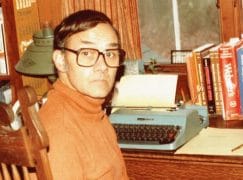
The Dutch-born pianist See Siang Wong has won the Swiss TV version of the cooking contest, Masterchef, known locally as SRF bi de Lüt Männerküche.
A teacher at the Zurich University of the Arts, See Siang Wong, 38 has recorded for Decca and Sony and has performed with Pierre Boulez among other eminent conductors.
In the TV final, he cooked fish in a banana leaf and beef randang. With a light touch, we are told.

Tributes are flooding in for the composer and guitarist Glenn Branca, who has died of throat cancer.
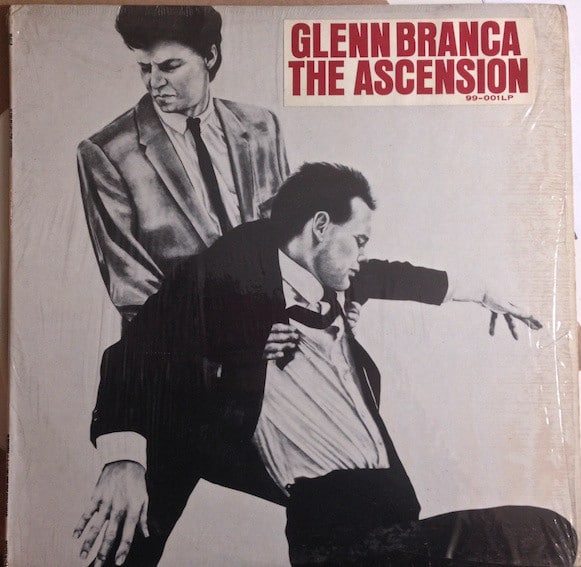
His death was announced on Twitter by his wife, Reg Bloor:
#glennbranca pic.twitter.com/qfWPRf7qaw
— Reg Bloor (@RegBloor) May 14, 2018
Branca wrote 16 symphonies for unorthodox combinations of instruments, some of which he built himself for the purpose. His influence extended across many genres, from punk to minimalism.
At a press conference to launch the 150th season, general director Dominique Meyer presented a statistic ‘correct up to this morning’ that 99.00 percent of all tickets had been sold throughout the season.
That must be some kind of record.
